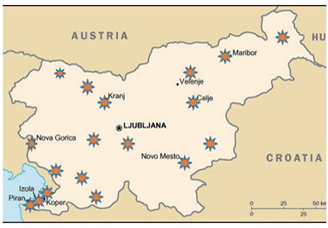National HCV Strategy
2022 Update
In Slovenia, the National Strategy for the Management of HCV Infection was developed in 1997 by the multidisciplinary National Viral Hepatitis Expert Board in close cooperation with the Ministry of Health, the National Health Insurance System, and non-governmental organisations.
The strategy included HCV prevention, testing and treatment, and was incorporated into the existing public health system. The first hepatitis C treatment guidelines were established in 1997 and free, anonymous testing has been rolled out over the past decade.
Why?
The prevalence of hepatitis C virus (HCV) infection in Slovenia (population: 2,000,000), is estimated at 0.3%, with an estimated 6,500 people testing HCV RNA positive. The majority of HCV-infected people are people who inject drugs (PWIDs). In 2014, it was estimated that HCV elimination could be achieved by 2030. However, in 2017, the National Viral Hepatitis Expert Board decided to accelerate progress by implementing several micro-elimination strategies focusing on sub-populations where HCV infection is most prevalent. Within these sub-populations, treatment and prevention interventions are delivered more efficiently using targeted methods.
How?

The sub-populations targeted by micro-elimination strategies included patient groups that are already regularly followed-up within the healthcare system (patients with haemophilia, patients receiving haemodialysis, organ transplant recipients, patients with end-stage liver disease, and people living with HIV) as well as the wider patient population (including PWIDs). Through multi stakeholder cooperation and an interdisciplinary approach, micro-elimination has been achieved in several sub-groups.
Cooperation
All patients with haemophilia who tested HCV RNA positive during an obligatory screening programme in the 1990s were identified from both the national register of haemophiliacs and the database of HCV infected people. In the event that the HCV-infected patient with haemophilia had not yet been treated successfully for HCV, they were actively encouraged to visit a specialist and immediately begin treatment with direct-acting antiviral (DAA) drugs. By 2018, no HCV-positive haemophilia patients were detected in Slovenia, making it the first country to completely eliminate HCV infection in people with haemophilia.
Of the estimated 6,000 to 8,000 PWIDs, around 4,500 receive high-threshold services at 18 regional Centres for the Prevention and Treatment of Drug Addiction (CPTDAs).
To increase the proportion of PWIDs treated for HCV and to achieve optimal treatment adherence, efficacy and safety, a multidisciplinary National Healthcare Network for the treatment of HCV infection in PWIDs was established in 2007. Two years after the introduction of the multidisciplinary network, the number of PWIDs treated for hepatitis C increased more than fourfold. By using new DAA drugs, treatment efficacy in PWIDs equals that of non-injectors.
Learnings
In Slovenia, elimination of HCV in certain sub-populations was achieved as a result of the establishment of the national strategy for the management of HCV infection over 20 years ago. It was supported by stakeholders, an interdisciplinary medical approach, and the availability and accessibility of new highly-effective and safe treatments. Although HCV elimination has been completed in several sub-groups, there is still a need for regular screening. Future HCV elimination initiatives include implementation of mobile units for HCV management in PWIDs and improvements in HCV management for incarcerated persons.
Funding
The whole continuum of services that provides for complex management of HCV infection in Slovenia, including treatment, has been fully publicly funded by the National Health Insurance System with just one condition: HCV treatment must be prescribed by specialists in viral hepatitis according to national guidelines.
Contacts
Prof. Mojca Maticic MD PhD, Clinic for Infectious Diseases and Febrile Illnesses, University Medical Centre Ljubljana
prof.maticic@gmail.com
Marko Korenjak, ELPA President
marko.korenjak@elpa.eu